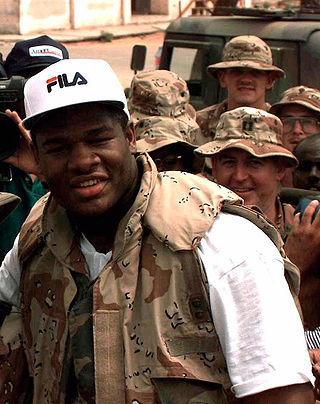
Riddick Lamont Bowe is an American former professional boxer and professional kickboxer who competed between 1989 and 2008 in boxing, and from 2013 to 2016 in kickboxing. He held the undisputed world heavyweight championship in 1992, and won the super heavyweight silver medal at the 1988 Summer Olympics.
Aleksandr Viktorovich "Alex" Miroshnichenko was a Russian-Kazakh professional boxer. As an amateur he represented the Soviet Union at the 1988 Summer Olympics, winning a bronze medal in the super-heavyweight division.

Ulrich Kaden is a former East German amateur boxer, best known for winning the European title 1987 and 1989 at super heavyweight.
The men's lightweight event was part of the boxing programme at the 1956 Summer Olympics. The weight class was allowed boxers of up to 60 kilograms to compete. The competition was held from 23 November to 1 December 1956. 18 boxers from 18 nations competed.
The men's light welterweight event was part of the boxing programme at the 1956 Summer Olympics. The weight class was allowed boxers of up to 63.5 kilograms to compete. The competition was held from 24 November to 1 December 1956. 22 boxers from 22 nations competed.
The men's light heavyweight event was part of the boxing programme at the 1972 Summer Olympics. The weight class allowed boxers of up to 81 kilograms to compete. The competition was held from 28 August to 10 September 1972. 28 boxers from 28 nations competed.
The men's light flyweight event was part of the boxing programme at the 1976 Summer Olympics. The weight class was the lightest contested, and allowed boxers of up to 48 kilograms to compete. The competition was held from 19 to 31 July 1976. 27 boxers from 27 nations competed.
The men's featherweight event was part of the boxing programme at the 1976 Summer Olympics. The weight class allowed boxers of up to 57 kilograms to compete. The competition was held from 18 to 31 July 1976. 26 boxers from 26 nations competed.
The men's welterweight event was part of the boxing programme at the 1976 Summer Olympics. The weight class allowed boxers of up to 67 kilograms to compete. The competition was held from 18 to 31 July 1976. 31 boxers from 31 nations competed.
The men's middleweight event was part of the boxing programme at the 1976 Summer Olympics. The weight class allowed boxers of up to 75 kilograms to compete. The competition was held from 19 to 31 July 1976. 19 boxers from 19 nations competed.
The men's light heavyweight event was part of the boxing programme at the 1976 Summer Olympics. The weight class allowed boxers of up to 81 kilograms to compete. The competition was held from 19 to 31 July 1976. 18 boxers from 18 nations competed.
The men's Super heavyweight event was part of the boxing programme at the 1984 Summer Olympics. The weight class allowed boxers of more than 91 kilograms to compete. The competition was held from 3 to 11 August 1984. 11 boxers from 11 nations competed.
The men's light welterweight event was part of the boxing programme at the 1988 Summer Olympics. The weight class allowed boxers of up to 63.5 kilograms to compete. The competition was held from 19 September to 2 October 1988. 45 boxers from 45 nations competed. 31-year-old Vyacheslav Yanovskiy won the gold medal.
The men's welterweight event was part of the boxing programme at the 1988 Summer Olympics. The weight class allowed boxers of up to 67 kilograms to compete. The competition was held from 20 September to 1 October 1988. 44 boxers from 44 nations competed. Robert Wangila won the gold medal.
The men's light middleweight event was part of the boxing programme at the 1988 Summer Olympics. The weight class allowed boxers of up to 71 kilograms to compete. The competition was held from 20 September to 2 October 1988. 36 boxers from 36 nations competed.
The men's light heavyweight event was part of the boxing programme at the 1988 Summer Olympics. The weight class allowed boxers of up to 81 kilograms to compete. The competition was held from 21 September to 2 October 1988. 26 boxers from 26 nations competed. Having started boxing just four years prior, Andrew Maynard won the gold medal.
The men's heavyweight event was part of the boxing programme at the 1988 Summer Olympics. The weight class allowed boxers of up to 91 kilograms to compete. The competition was held from 22 September to 1 October 1988. 18 boxers from 18 nations competed. 27-year-old Ray Mercer, who took up boxing only four years prior, won the gold medal.
The men's middleweight event was part of the boxing programme at the 1992 Summer Olympics. The weight class allowed boxers of up to 75 kilograms to compete. The competition was held from 28 July to 8 August 1992. 28 boxers from 28 nations competed.
The men's heavyweight event was part of the boxing programme at the 1992 Summer Olympics. The weight class allowed boxers of up to 91 kilograms to compete. The competition was held from 28 July to 8 August 1992. 23 boxers from 23 nations competed.
The men's super heavyweight event was part of the boxing programme at the 1992 Summer Olympics. The weight class allowed boxers of more than 91 kilograms to compete. The competition was held from 27 July to 9 August 1992. 17 boxers from 17 nations competed.


